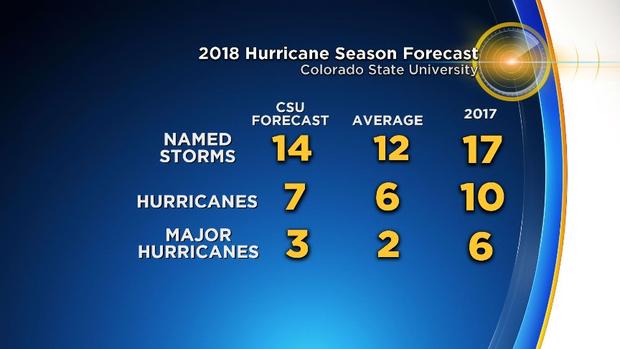2018 Hurricane Season Could Be Another Busy Season
Follow CBSMIAMI.COM: Facebook | Twitter
MIAMI (CBSMiami) - Hurricane Season begins June 1st and Colorado State University forecasters predict a slightly above-average 2018 Season.
Meteorologists at CSU released the forecast today calling for 14 named storms, 7 hurricanes and 3 major hurricanes. This is just above the 30-year average of 12 named storms, six hurricanes and two major hurricanes.
A major hurricane is one that is Category 3 or stronger on the Saffir-Simpson Hurricane Wind Scale.
Last year we had 17 named storms, 10 Hurricanes and 6 Major Hurricanes.
The CSU outlook is based more than 30 years of statistical predictors, combined with seasons exhibiting similar features of sea-level pressure and sea-surface temperatures in the Atlantic and eastern Pacific Oceans. CSU meteorologists do not anticipate a significant El Nino event this summer. The Western tropical Atlantic waters are warm right now, while portions of the eastern tropical Atlantic and far Northern Atlantic are anomalously cool.
Consequently, the Atlantic multi-decadal oscillation index is near its long term average. Hence, CSU forecasters "anticipate a slightly above-average probability for major Hurricanes making landfall along the continental United States Coastline and in the Caribbean."
Though the official Atlantic hurricane season runs from June through November, occasionally we can see storms form outside those months, as happened last season with April's Tropical Storm Arlene.
NOAA will release its Hurricane Season forecast in May.
As with every Hurricane Season, residents of South Florida are reminded that it only takes one Hurricane making landfall to make it an active season for them. Everyone should prepare the same for every season, regardless of how much activity is predicated.




